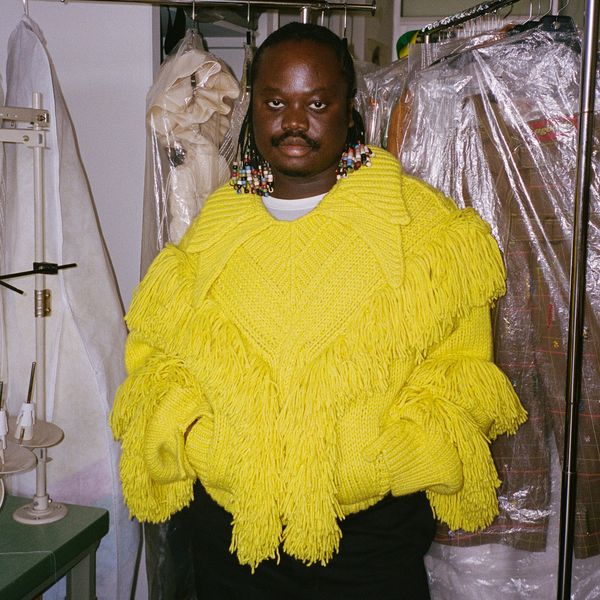
Coolest Person in the Room: Jacques Agbobly
Story by Andrew Nguyen / Photography by Diego Villagra Motta
Mar 15, 2024
Popularity is relative, especially in the digital age. You could have hundreds of thousands of followers online but be completely unknown in the streets — massively famous on Instagram, YouTube or Twitter, but lack any kind of real, authentic cool in person. For our series Coolest Person in the Room, we pinpoint all the people whose energy is contagious regardless of their following count or celebrity. Meet Jacques Agbobly — the fashion designer and 2024 LVMH Prize semi-finalist you need to know.
Tell me about growing up in Togo!
Growing up in Togo was colorful and joyful. There was a comforting sense of security and safety that I felt while living in Lomé with my family, where I felt extremely protected and nurtured, and this helped me in discovering and developing my own sense of self. I was actively encouraged to embrace my true self and think creatively.
I grew up mostly living between my grandmothers’ homes during the summer and my Aunt Damè during the school year. My grandmother’s house was always so vibrant and full of life because the house itself held so many different businesses. My uncles ran a tech repair shop at a part of the house, my Aunt Rita owned a bar that was attached as well, called Bar Happy Land, and another part was rented out to seamstresses and tailors. She also would fry and sell fish just across the street so there was really never a dull moment. Even when she passed, over 300 neighbors gathered there to honor her memory. Even if I didn't know it back then, I think the reason why I loved spending the summers there so much was because I was learning how so many different people ran their business and what it meant to be raised by a village.
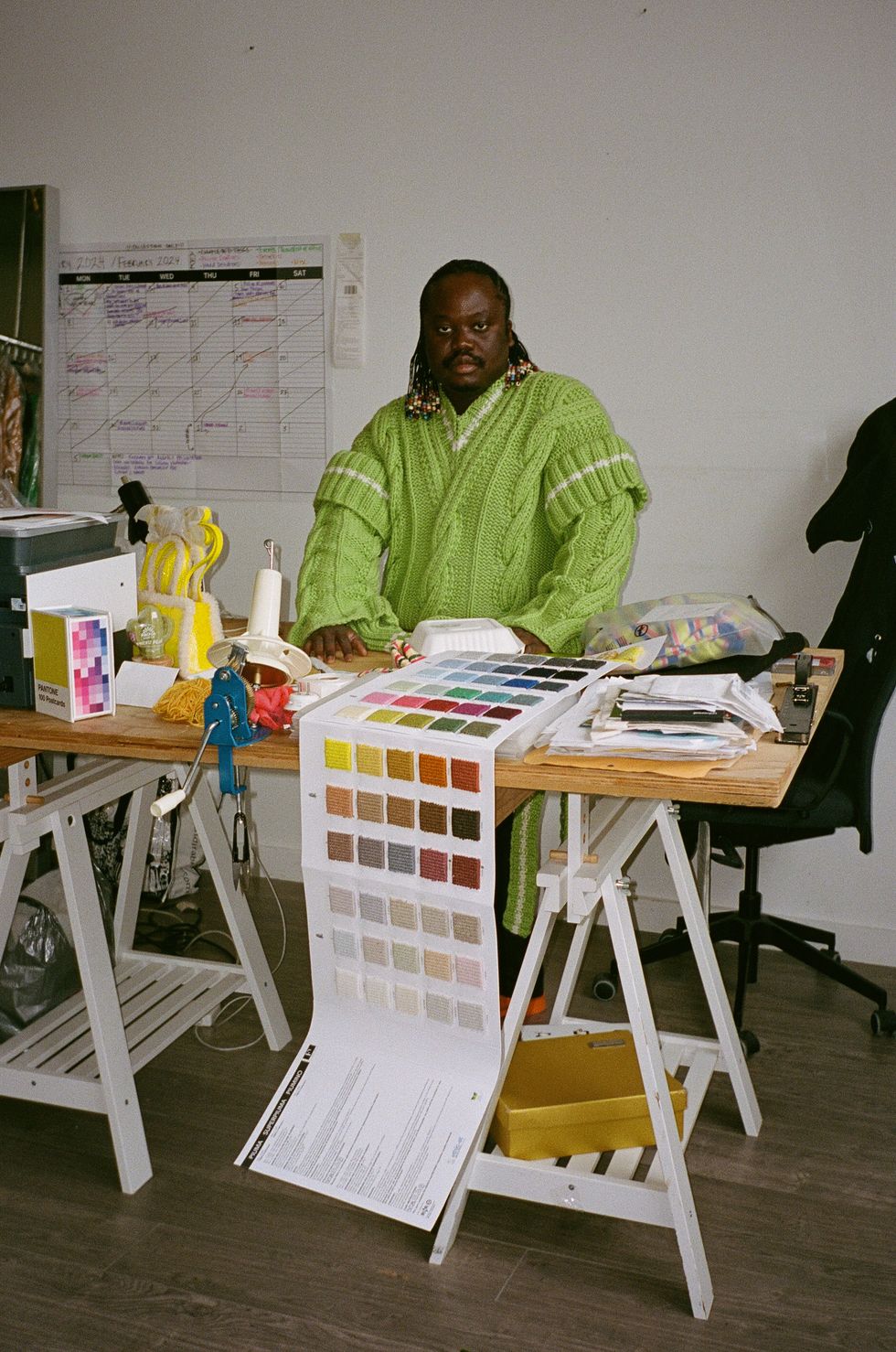
What were you doing before you started your brand?
Before I started Agbobly, I was always thinking about how I could create something of my own. In my years at Parsons, I focused heavily on refining my skills as a designer and exploring avenues to establish a brand that felt true to me and reflected my ideas, my identity and what I perceived to be lacking in the industry. When the pandemic hit, it was my senior year, and I was sent home a month before graduation while I was finishing my thesis. During that time I was grappling with the global mistreatment of Black individuals, particularly within fashion. I was looking for a full time job but couldn't find any opportunities, so I decided to take that leap of faith and launch my brand. Starting Agbobly during a time of global uncertainty allowed me to focus on what I could control: creating. I had a knitting machine and was able to obtain a studio with the help of a past professor, which allowed me the time to hone in on my designs. I started by selling customized tank tops, but since then, Agobbly has grown into a full ready-to-wear collection.
Is there something that encouraged you to take that leap of faith and launch the brand?
Facing a global pandemic played a significant role, as well as the realization that it felt like divine timing. I had an outpouring of support from my community and my teacher, Annie Lee Larson, who initiated a GoFundMe campaign to aid me in securing a studio space. but also went above and beyond by providing me with video tutorials to aid in my knitwear development process. Her unwavering support eased in so many hurdles that came along the way and because she is also a knitwear designer for her own company AllKnitwear, she taught me so much about the industry and played a significant role in my journey. Having a dedicated space at the time to nurture my creativity during the pandemic really served as a powerful motivator. I would showcase my knits on Instagram stories, and the overwhelming responses I received of people wanting to make a purchase solidified that I was on the right path. I started selling without a clear roadmap and was truly just driven to create things that I loved, while also making sure that other people had access to what I made as well.
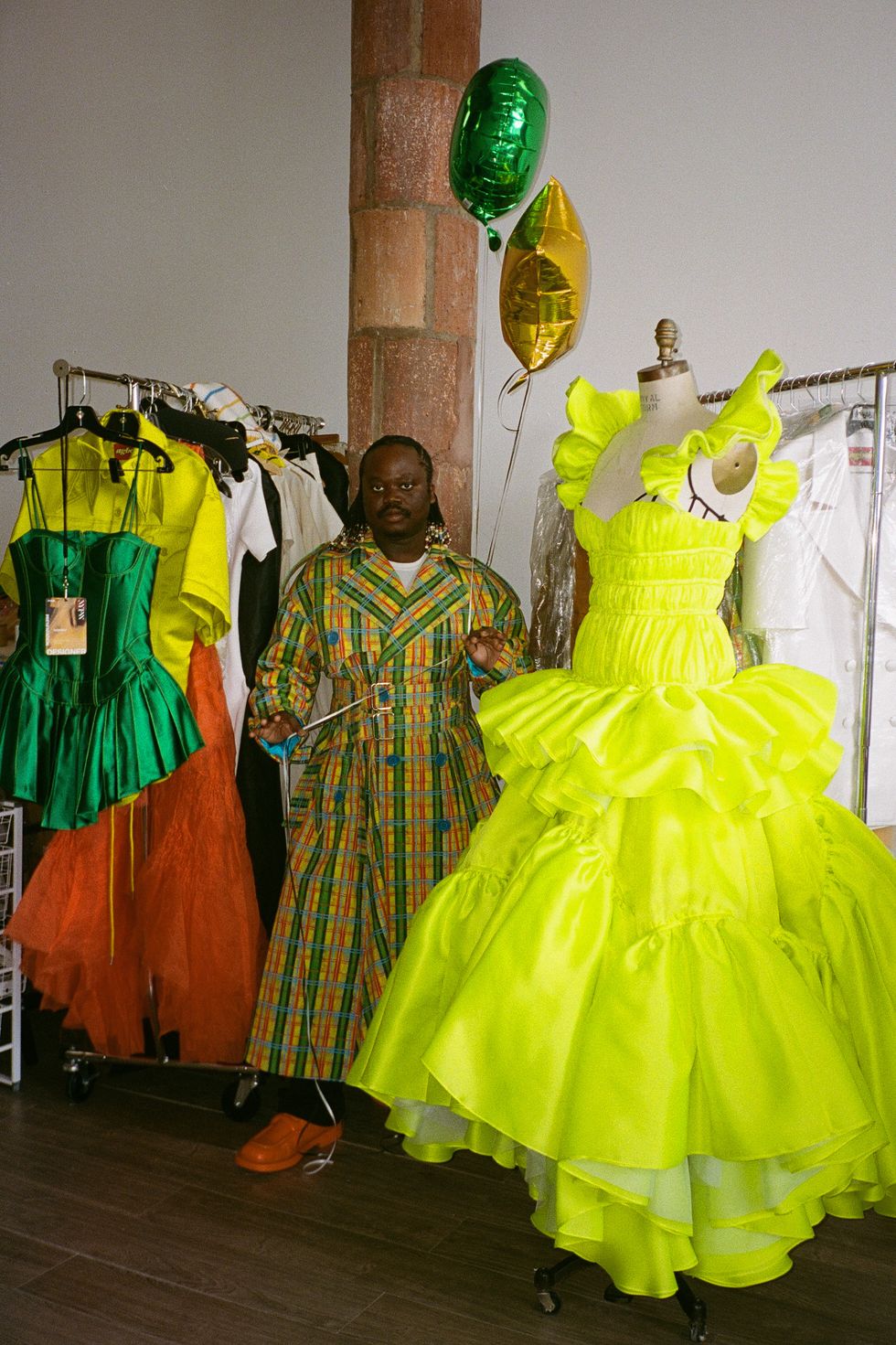
How is your POV is necessary and important in the fashion industry?
I believe that the fashion industry has made notable progress, and that's evident in the emergence of numerous brands representing diverse diasporas. However, an issue that I personally witness in fashion spaces is the tendency to homogenize the experiences of Black individuals. I think this is what ultimately leads to a perception that we all share identical backgrounds. This perception can inadvertently pit us against each other for recognition and opportunities, which is unfair. Blackness encompasses so many different cultures and life experiences, and I aim to celebrate this diversity through my work
I am a Black, queer African person, and I recognize that my identity is multifaceted and unique, and that influences how I navigate the world. This is again to remind the world that Africa is filled with so much cultural diversity. Being Togolese comes with different cultural norms, and it's crucial to acknowledge and embrace this diversity rather than attempting to fit Black creatives into a narrow stereotype. We should create spaces where Black individuals can authentically express themselves and showcase their artistry without being constrained by preconceived notions or forced into restrictive categories.
I aspire for Agbobly to achieve global recognition because showcasing African craftsmanship on a worldwide scale would mark a significant milestone in the fashion industry. Having experienced life both in Chicago and Togo, I think I bring a distinct viewpoint to my work. Through my creations, I aim to narrate not only my personal journey, but also highlight the beauty and essence of both communities that shaped my upbringing. Growing up immersed in these diverse environments has endowed me with a unique perspective.
Tell me about West African hand craft techniques and about what makes them so unique.
My vision involves creating a world where Africa is not perceived as a distant land disconnected from the rest of the globe. In the future, I definitely want to be able to build something in Togo and hire local workers that can fully showcase their hand craft techniques: custom tailoring, hand-dyed fabrics and prints and weaving. I think emphasizing these diverse techniques is crucial due to the frequent undervaluation of African craftsmanship. I spent most of my life rarely witnessing African artistry represented in the luxury market. I think that now we are going through a renaissance that is offering an opportunity to showcase these works through a global market, and I am determined for Agbobly to be a part of it. De-homogenizing the notions of luxury is an important step in showcasing different styles in the actual creation of clothing in order for fashion to move forward.
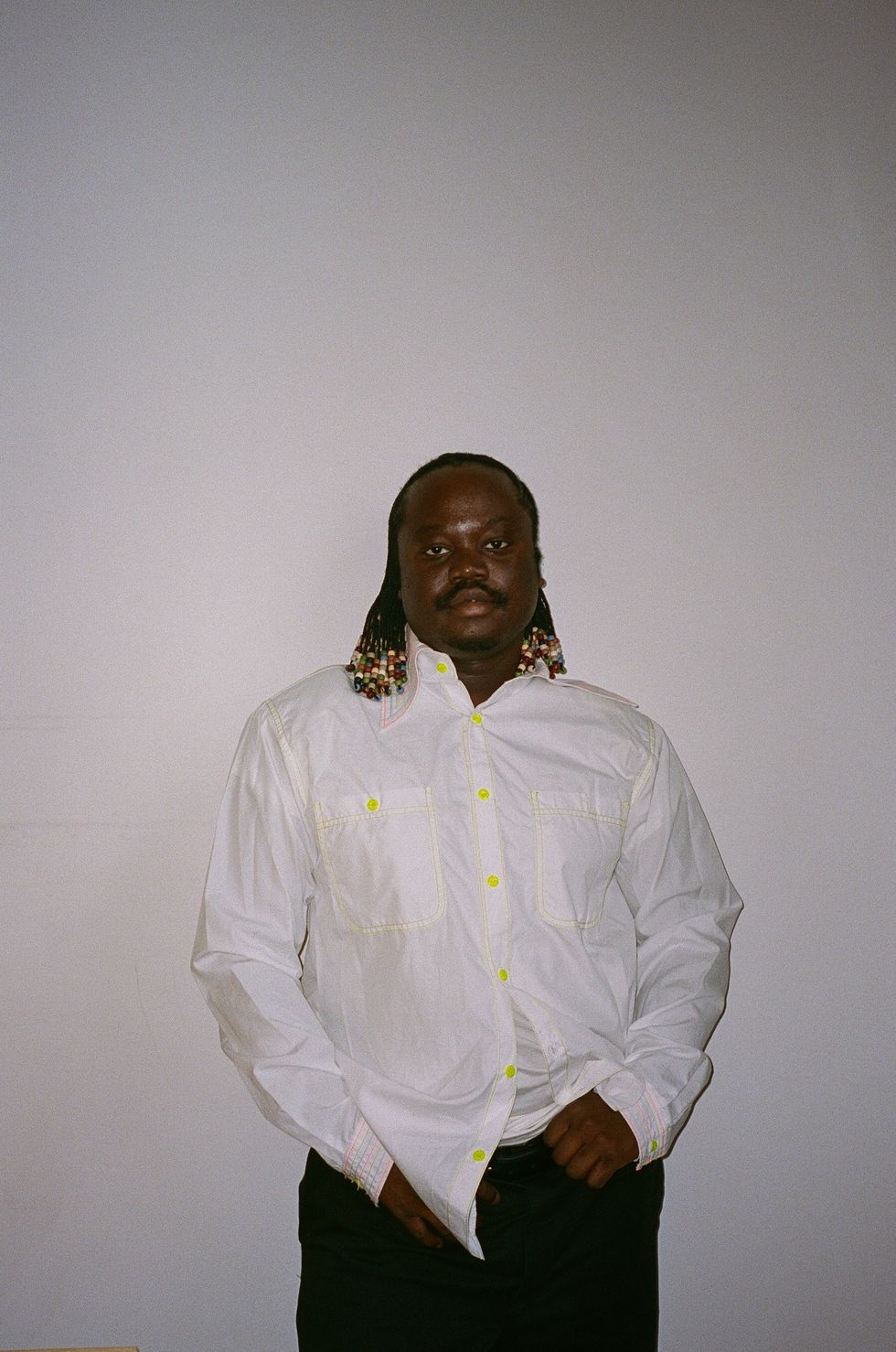
Who are some of your biggest inspirations?
A prominent theme in my work revolves around family — a quest for a sense of belonging. I draw inspiration from all of my family members, particularly the women who have played pivotal roles in shaping my upbringing. These women serve as beacons of inspiration, each contributing to my development in their own significant ways. My aunts, who were entrepreneurs in their own right, taught me the value of perseverance through their own ventures. My grandmother, who fostered an environment of growth and opportunity within her home, instilled in me the importance of community and entrepreneurship. My mother's journey to America, where she worked tirelessly braiding hair and saving every penny to pave a better path for my siblings and me, exemplifies the pursuit of the American dream. Even my late Aunt Love, a go-go dancer known for her extravagant costumes, left an indelible impression on me through her vibrant spirit and stories of her life.
My father would wander the streets of Lomé, navigating on his scooter while lugging a bag brimming with second-hand clothing for sale, and he played a significant role in nurturing my love for fashion and craftsmanship.
I grew up surrounded by family members that personified hard work and showed me everyday how to not make working hard my entire identity. They were people who enjoyed life and this is something that I now want to embody in my own brand identity. While I acknowledge the effort and dedication behind my craft, I refuse to let it define my identity. My family has worked tirelessly to provide me with opportunities and alleviate my burdens, and while I work diligently, I do not want my narrative to solely revolve around hard work.
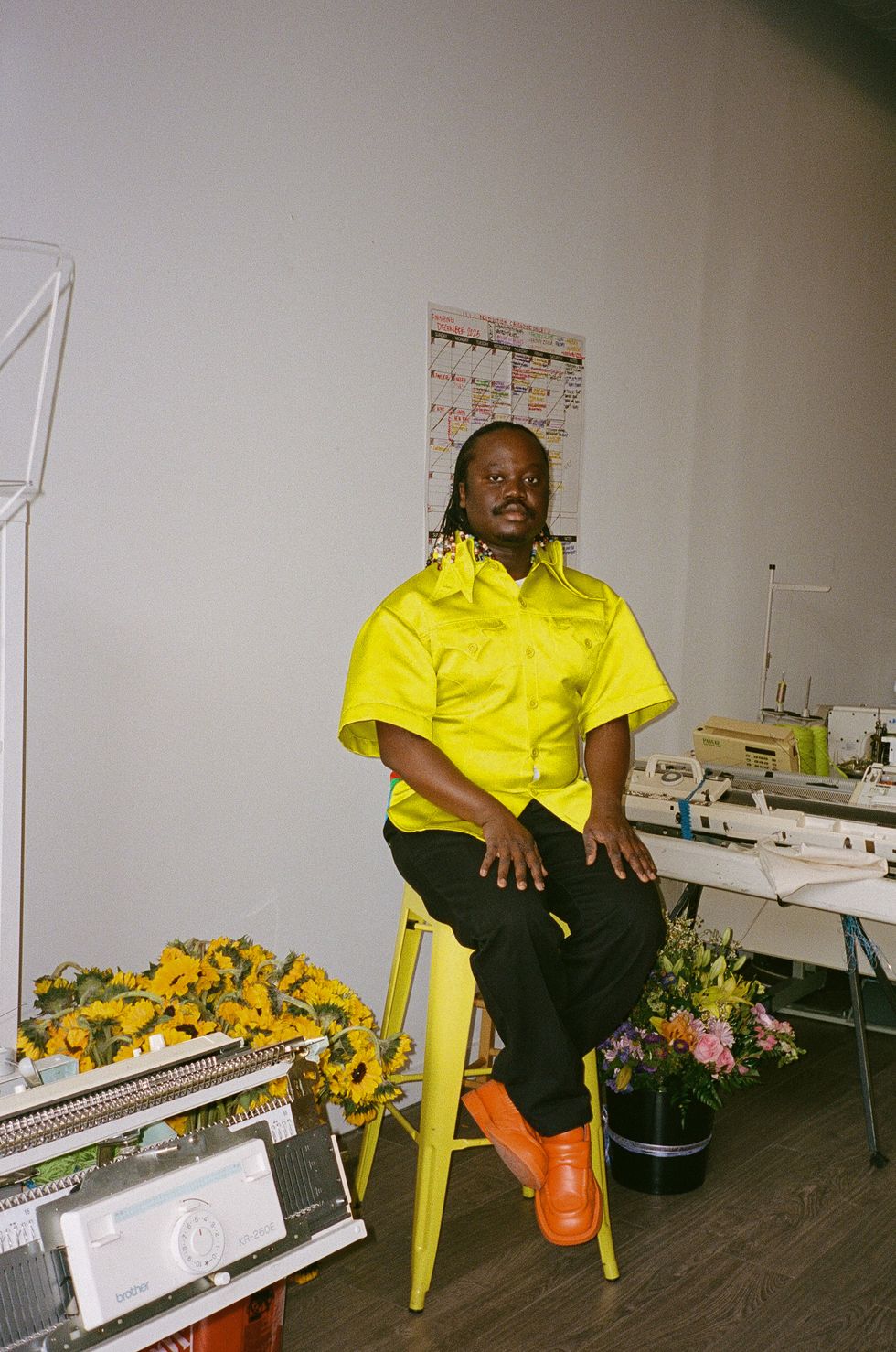
What’s your secret to finding so much joy and optimism in fashion?
I often reminisce about my earliest memory of witnessing clothing being crafted for the first time. It was in the tailor's workshop that was connected to my grandmother's home. It was an encounter with fashion in its purest form, and in a way, it felt like where creativity unfolded before my eyes. The joy I felt in that safe space has been a guiding force throughout my career. Whenever I face challenges or navigate the tumultuous events of the world, I reflect on that memory and reconnect with my purpose. As a designer, I believe it's our responsibility to create things that spread happiness. Fashion, to me, embodies optimism and the power to bring joy into the world. I firmly believe that joy is a vital yet often overlooked emotion, and it's something we should actively pursue every day.
My community also consistently brings me joy and optimism. They are the people I can turn to for a vent session after a long day, or simply to discuss my favorite TV shows. These are aspects of life that we may occasionally overlook, but they are the very things that provide us with the strength to persevere.
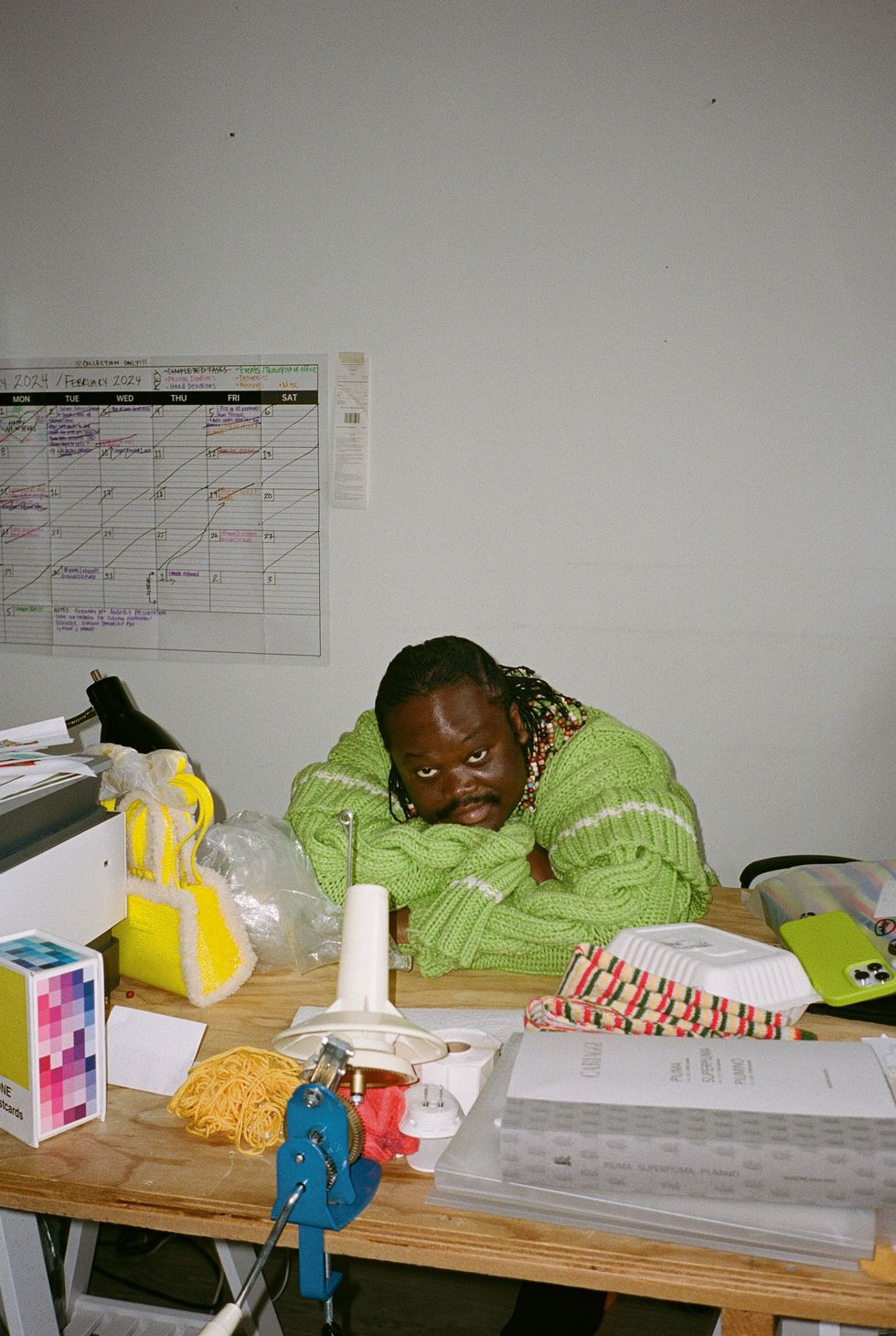
What change do you hope to see in the fashion industry?
I’m really passionate about seeing greater support extended to young designers and stronger backing from established brands and fashion houses. While creativity is undoubtedly vital and propels the industry forward, it's essential to have structural support and adequate funding to sustain it. In my mind, funding and mentorship should go hand in hand; they are mutually reinforcing. I personally entered this industry amidst the pandemic without the opportunity to apprentice under another professional, learning everything through trial and error. But I believe having a mentor from the outset would have been invaluable, facilitating connections and providing guidance. A mentor can help strike a balance between creativity and business acumen, channeling artistic vision into a successful enterprise.
I strongly advocate for greater diversity and inclusion of Black perspectives within the industry. Unfortunately, I think there’s this mentality amongst so many people that resources shouldnt be shared outside of their collectives, and to me that hinders the collective progress. In the future, I yearn for a fashion community where mutual encouragement and support thrive, akin to what is seen in other industries where new voices are welcomed and space is created for diverse perspectives. Personally, I celebrate the successes of my friends as if they were my own and I firmly believe that we all strive diligently to achieve our goals and witnessing their triumphs fill me with the same joy and pride I feel when I succeed.
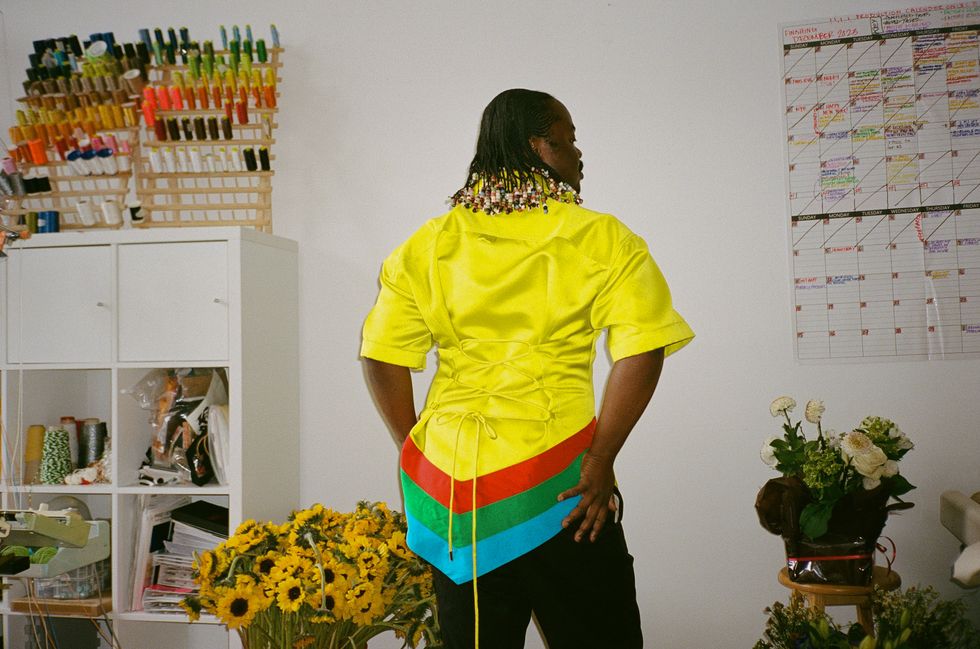
What’s your wildest dream?
I want to win the 2024 edition of the LVMH Prize. I want to evolve Agbobly into a comprehensive heritage brand that truly encompasses home goods, fashion and lifestyle. The unofficial but official tagline is “Agbobly to the world,” and my ultimate goal is to attain global success that’s comparable to brands like Louis Vuitton, Dior and Loewe. I want to be the creative director of a fashion house. I want to go on a bomb vacation with my friends. I want to costume design for an Oscar Award-winning film. I would be thrilled to design some pieces for a world tour for some of my favorite artists. I seek security and stability in my craft, my business and personal life. I want the successes that my friends and my family crave to come true.
Photography: Diego Villagra Motta
Editor-in-chief: Justin Moran
Managing editor: Matt Wille
Fashion editor: Andrew Nguyen
Editorial producer: Angelina Cantú
From Your Site Articles
Related Articles Around the Web
MORE ON PAPER
ATF Story
Madison Beer, Her Way
Photography by Davis Bates / Story by Alaska Riley
Photography by Davis Bates / Story by Alaska Riley
16 January
Entertainment
Cynthia Erivo in Full Bloom
Photography by David LaChapelle / Story by Joan Summers / Styling by Jason Bolden / Makeup by Joanna Simkim / Nails by Shea Osei
Photography by David LaChapelle / Story by Joan Summers / Styling by Jason Bolden / Makeup by Joanna Simkim / Nails by Shea Osei
01 December
Entertainment
Rami Malek Is Certifiably Unserious
Story by Joan Summers / Photography by Adam Powell
Story by Joan Summers / Photography by Adam Powell
14 November
Music
Janelle Monáe, HalloQueen
Story by Ivan Guzman / Photography by Pol Kurucz/ Styling by Alexandra Mandelkorn/ Hair by Nikki Nelms/ Makeup by Sasha Glasser/ Nails by Juan Alvear/ Set design by Krystall Schott
Story by Ivan Guzman / Photography by Pol Kurucz/ Styling by Alexandra Mandelkorn/ Hair by Nikki Nelms/ Makeup by Sasha Glasser/ Nails by Juan Alvear/ Set design by Krystall Schott
27 October
Music
You Don’t Move Cardi B
Story by Erica Campbell / Photography by Jora Frantzis / Styling by Kollin Carter/ Hair by Tokyo Stylez/ Makeup by Erika LaPearl/ Nails by Coca Nguyen/ Set design by Allegra Peyton
Story by Erica Campbell / Photography by Jora Frantzis / Styling by Kollin Carter/ Hair by Tokyo Stylez/ Makeup by Erika LaPearl/ Nails by Coca Nguyen/ Set design by Allegra Peyton
14 October




